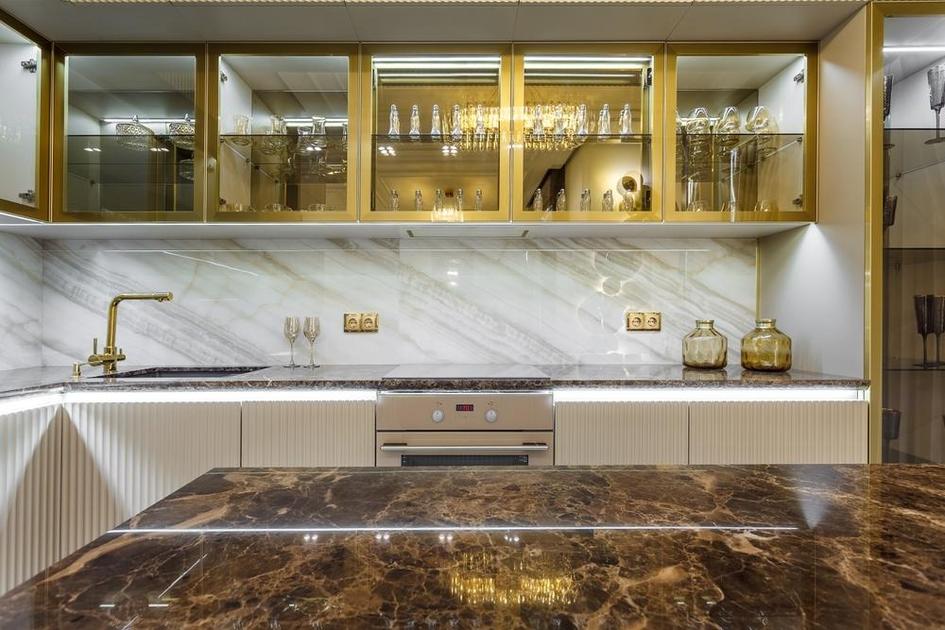Considering a new kitchen or bathroom upgrade? Natural stone countertops might be the perfect solution to enhance your home’s aesthetic and functionality. Their popularity continues to rise due to unmatched beauty and resilience. In this article, explore everything you need to know about integrating these stunning surfaces into your home.
Benefits of Choosing Natural Stone
Choosing natural stone countertops for your home offers a suite of aesthetic and functional benefits. Its timeless appeal transforms any kitchen or bathroom into a masterpiece of design.
Timeless Beauty
Natural stone is celebrated for its classic and enduring beauty. Each slab is unique, providing a one-of-a-kind look that complements any style, from traditional to modern.
Durability
Natural stone is incredibly durable. Granite, marble, and quartzite resist scratches and heat, making them perfect for the demanding kitchen environment.
Value Addition
Installing natural stone countertops can increase the value of your home. Potential buyers often view these materials as premium, which can enhance your property’s appeal.
Environmental Friendliness
As a natural product, stone is more environmentally friendly than synthetic alternatives. It is sustainable and reduces the need for chemically reactive materials.
Variety and Versatility
With natural stone, there are numerous colors and patterns to choose from, allowing for a high degree of customization to fit any design theme.
Types of Natural Stone Countertops
Understanding the different types of natural stone available can help you select the perfect countertop for your needs and preferences.
Granite
Granite is one of the most popular choices for kitchen countertops. Its strength and density make it heat-resistant and virtually unbreakable under normal circumstances. It comes in a variety of colors, ranging from light to dark tones.
Marble
Marble offers a luxurious, classic look. It’s best suited for areas where the counters aren’t heavily used, as it’s more porous and can be prone to staining. However, its natural veining provides unparalleled elegance.
Quartzite
Quartzite, unlike quartz countertops made from engineered stone, is naturally occurring and extremely hard. It mimics the appearance of marble but with better resistance to scratches and etching.
Soapstone
Soapstone is known for its deep, rich color and smooth texture. It’s highly resistant to stains and bacteria, making it an excellent choice for both kitchens and bathrooms.
Slate
Slate countertops are rare but provide a natural, rustic look. It is less porous, offering a consistent appearance without the veining found in other stones.
Care and Maintenance Tips
Maintaining natural stone countertops is straightforward but essential for keeping your counters looking their best.
Sealing
Most natural stone countertops require sealing to protect them from stains. Granite and marble, for example, benefit from regular sealing, typically once a year.
Cleaning
Use a mild dish soap and a soft cloth for daily cleaning. Avoid acidic or abrasive cleaners that can damage the stone’s surface.
Stain Prevention
- Wipe up spills immediately, especially wine, juice, or oil, to prevent stains.
- Use coasters and trivets to protect the surface from heat and scratches.
Periodic Deep Cleaning
Perform deep cleaning with a specialty stone cleaner to ensure accumulated grime doesn’t affect the appearance.
Avoiding Impacts
While durable, natural stone should be treated with respect to avoid chipping or breaking. Avoid dropping heavy items on the surface.
Cost Considerations and Budgeting
The cost of natural stone countertops can vary significantly based on the type of stone, its origin, and the installation complexity.
Material Costs
Granite and soapstone often offer an affordable midpoint, while marble and quartzite can reach higher price points due to their premium status.
Installation Costs
Installation is a significant factor in the total cost. Professional installation ensures that the stone is properly set, leveled, and sealed, which is critical for longevity and aesthetics.
Additional Costs
- Custom edges and finishes: Adding these can elevate the look but also increase the expense.
- Backsplashes and matching sinks: Additional features like these will add to the overall budget.
Long-Term Investment
Consider natural stone countertops an investment. While the upfront costs are higher than synthetic alternatives, the durability and added home value can justify the expense.


